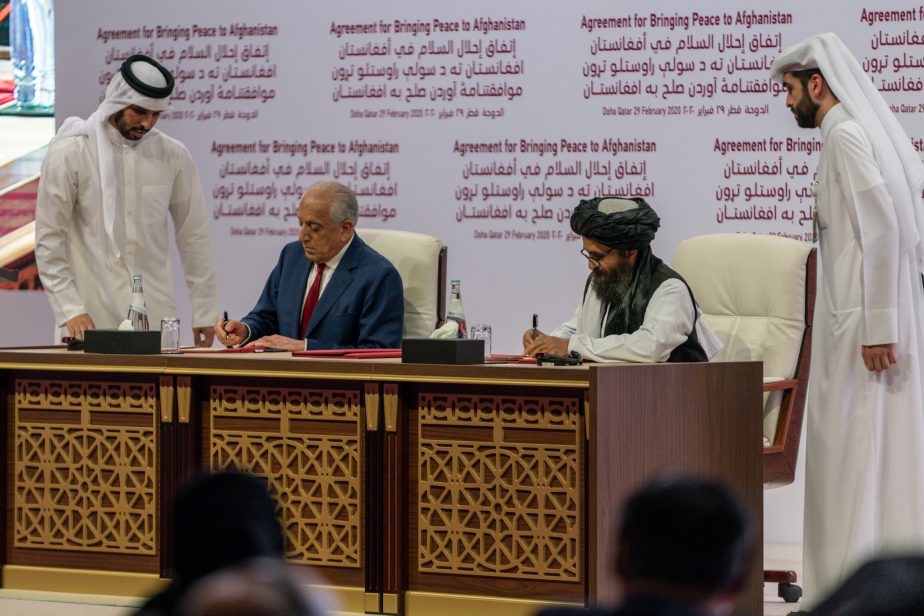The US-Taliban Deal Ignores Human Rights and Women
Farahnaz Ispahani
The Trump administration’s deal with the Taliban ignores human rights concerns.
The recently signed peace deal between the United States of America and the Taliban, whom the U.S. deemed as terrorists until recently, reflects not just American military withdrawal from Afghanistan but also an abandonment of Afghan women, children, and religious minorities.
Given the well-documented record of their atrocities, particularly the group’s targeting of women, it would have made sense for any agreement with the group to include specific commitments to at least renounce their past conduct.

But the Trump administration has agreed to lift sanctions against the Taliban without explicit pledges relating to human rights and the protection of the status of women. The Doha agreement of February 29 lays down a timeline for the withdrawal of American troops in exchange for the Taliban breaking ties with al-Qaeda and agreeing to talks with other Afghans on the country’s future.
The administration’s desire to withdraw American troops after 18 years of war is understandable. The United States went into Afghanistan to locate and destroy al-Qaeda safe havens in the aftermath of the 9/11 terrorist attacks on U.S. soil. It has been almost two decades since 9/11 and most Americans have lost the sense of urgency in confronting radical Islamist extremism that led to the U.S. military intervention in Afghanistan.
Still, that is no reason to give up on the right of Afghan women and religious minorities to education, employment, and a place in the political process, which the Taliban’s ideology denies, and the Afghan constitution protects.
The war in Afghanistan was not just about extracting a vague promise from the Taliban that they would not allow terrorists from other countries to congregate in the country and wage war against the United States. The Taliban offered sanctuary to al-Qaeda because they agreed with its belief system. How can it be in U.S. national security interest to normalize the Taliban unless they renounce that ideology, not just a few foreign groups that share it?
When the Taliban last controlled Afghanistan, from 1996 to 2001, many Afghans suffered, and women and religious minorities suffered the most.
Barred from education and employment Afghan women, in contrast to their tradition of simply covering their heads, had to cover themselves from head to toe when leaving their homes. Women who defied these diktats were punished using archaic and brutal measures, including lashings and public beatings.
Since 2001, the United States has given $29 billion in civilian assistance to Afghanistan to make it a better country for its people. This has been an investment in creating an environment that does not breed terrorists.
As a result, more than 3.5 million girls are enrolled in primary and secondary schools and 100,000 women attend universities. 85,000 Afghan women work as teachers, lawyers, law enforcement officials, and in healthcare.
The Afghan Constitution, adopted in 2004 with U.S. support, guarantees equal legal rights and duties for men and women, bars discrimination, and requires a “balanced education for women.” While Afghan society remains conservatively Islamic, the constitutional and legal framework enables human rights defenders and social modernizers to reform their society.
Soon after the United States began talks with them, the Taliban tried to placate critics with statements effectively saying that they had learned over time and recognized that women have certain rights under Islam, including access to education and jobs, property inheritance, and the ability to choose a husband. But they remain unrepentant about what they describe as the defense of Islamic and Afghan values.
The Taliban may have figured out how to present their case better to the Western media, but it is quite clear that their core values and beliefs have not changed.
U.S. negotiators during their talks with the Taliban remained narrowly focused on discussing American withdrawal in return for the Taliban’s promise not to host al-Qaeda in future.
Women and religious minorities of Afghanistan were not only not at the table of the so-called peace talks, they were not even on the minds of American negotiators. Even the democratically elected Afghan government was kept at arm’s length.
It was as if, after spending billions of dollars on rebuilding Afghanistan and creating democratic institutions, the United States just wanted to walk away.
The dozens of attacks by the Taliban across 24 out of 34 Afghan provinces soon after the signing of the deal reflects the fallacy of the narrow conception of security reflected in the U.S.-Taliban agreement. A deadly attack that killed 15 Afghan soldiers led to ‘”defensive” U.S. airstrikes.
This was a reminder that peace cannot be bought from terrorists by selling out the human rights of others. Encouraged by a deal with the U.S., the Taliban will be more ruthless, not less. America’s interests would best be served by standing up for American values.
The article was published by THE DIPLOMAT on March 6, 2020, link to the original articlehttps://thediplomat.com/2020/03/the-us-taliban-deal-ignores-human-rights-and-women/